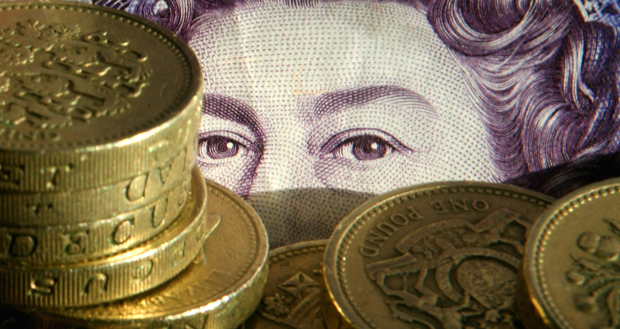Is cash dying out - and should you care?
Earlier this year card transactions overtook those settled with physical money for the first time

A free daily email with the biggest news stories of the day – and the best features from TheWeek.com
You are now subscribed
Your newsletter sign-up was successful
It hasn’t been a good year for cash. Back in May card and automated payments overtook physical money as the payment method of choice for the first time. Now, a trade association has announced that it expects cash use to dwindle in the coming years.
What is happening?
Cold hard cash is falling out of favour with many shoppers. Data from the Payments Council has found that more of us pay with debit cards, credit cards or automated payments than with cash these days.
The Week
Escape your echo chamber. Get the facts behind the news, plus analysis from multiple perspectives.

Sign up for The Week's Free Newsletters
From our morning news briefing to a weekly Good News Newsletter, get the best of The Week delivered directly to your inbox.
From our morning news briefing to a weekly Good News Newsletter, get the best of The Week delivered directly to your inbox.
In the year to May 2015 businesses, consumers and financial organisations made 18.3bn cash payments, versus 19.8bn non-cash payments. That’s means cash was used to settle only 48 per cent of all tranactions.
By 2024 we’ll only be using cash twice every three days, according to Payments UK. Instead we will favour our plastic using debit cards to make most of our purchases.
The trade body believes we’ll buy more items that were traditionally bought with cash, such as groceries and lottery tickets, online. Meanwhile small transactions such as newspapers or lunch will be paid for with a card.
Does this spell the end for cash?
A free daily email with the biggest news stories of the day – and the best features from TheWeek.com
Not necessarily. “Cash remains a vital part of our day-to-day lives and is still the most attractive or only option in lots of situations,” David Hensley, director of payments industry body Cash Services, told the Guardian. “We continue to value notes and coins so highly for their familiarity and widespread acceptance.”
There are also lots of us who like to stockpile cash. “The prevalence of hoarding has also firmed up the demand for physical money,” says Peter Spence in The Telegraph. Hoarding is where you keep your cash in a safety deposit box, or under the mattress or buried in the garden - anywhere rather than in a bank account.
Finally, there is the illegal economy that values cash very highly. Whether it’s simply using cash to avoid tax or for larger scale criminal transactions, the fact cash cannot be traced makes it “likely to remain resilient,” says the Bank of England.
Who wants to get rid of cash?
Many governments around the world would like us all to move away from using cash. In Denmark the government recently allowed shops to stop accepting cash in an effort to reduce the use of physical currency.
The reasons are numerous. Firstly, cash can be a burden. “Handling cash is expensive – you have to process it, give people change for it, provide security for it, take it to the bank, etc,” says Merryn Somerset Webb in MoneyWeek. We continue have to replace notes and coins as they become worn out, too.
As alluded to above, getting rid of cash would also help reduce crime. “Anything paid for via the banking system can be taxed; anything paid for in cash can be missed,” says Webb. “Physical cash often means physical crime, so getting rid of cash could mean less crime and less tax evasion.”
Central banks would also benefit if we eradicated physical currency. Those of us who hoard cash prevent the government and central banks from having full control of monetary policy. Whatever they do to rates these people will continue to sit on their rainy day funds. No physical cash would mean they had a better hold on making us all spend or save depending on what benefits the wider economy.
Why should we fight for cash?
While there are some up sides to getting rid of cash – less crime, lower costs for retailers – it isn’t all good news.
As mentioned, no physical cash would leave people more at the mercy of central banks trying to control the economy. Interest rates could go negative, as is the case in Sweden, leaving your savings shrinking - and without physical cash you wouldn’t be able to withdraw your money to avoid the decline.
The end of cash is also impossible at present. Research by the Financial Inclusion Commission has revealed that two million adults in the UK do not have a bank account. That means they have no access to a debit card so simply wouldn’t be able to function within a cashless economy.
“Cash is not likely to die out any time soon,” the Bank of England concluded in the Telegraph.
-
 Why are election experts taking Trump’s midterm threats seriously?
Why are election experts taking Trump’s midterm threats seriously?IN THE SPOTLIGHT As the president muses about polling place deployments and a centralized electoral system aimed at one-party control, lawmakers are taking this administration at its word
-
 ‘Restaurateurs have become millionaires’
‘Restaurateurs have become millionaires’Instant Opinion Opinion, comment and editorials of the day
-
 Earth is rapidly approaching a ‘hothouse’ trajectory of warming
Earth is rapidly approaching a ‘hothouse’ trajectory of warmingThe explainer It may become impossible to fix